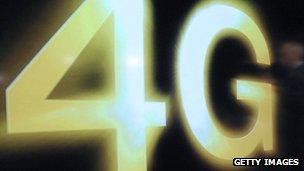4G: UK's mobile phone networks in crunch meeting
- Published

A meeting about the UK's roll-out of 4G network services takes place later.
Mobile operators, Culture Secretary Maria Miller and communications regulator Ofcom will discuss bringing forward the allocation of spectrum to allow faster mobile download speeds.
Ofcom has told the government that the process could be accelerated to launch 4G networks in many places by May or June.
It had been thought that it would take until the end of the year.
Ahead of the meeting O2 said that it was hopeful that it could launch 4G services in summer 2013.
Ronan Dunne, chief executive of O2, said, "It's been a very good process and it feels that we've made a lot of progress, so I'm hopeful that we'll have a basis for moving forward."
But he went on to express disappointment that Ofcom had not acted earlier: "We're pleased that we've made progress but frustrated that it's taken so long".
An Ofcom spokesman responded: "To suggest that the delay has been caused by anything other than litigation - and the threat of litigation - on behalf of competing companies is inaccurate."
Previously O2 and Vodafone had expressed anger that rival network EE - formerly known as Everything Everywhere - had been given permission to use its existing 1,800MHz spectrum to launch a 4G service earlier.
O2 had threatened legal action to prevent EE gaining this advantage.
A deal could pave the way for EE to announce its 4G launch date, which could be before the end of this month.
'Clever move'
O2 and Vodafone will not be able to offer 4G until other parts of the radio spectrum - including those previously used for analogue television and air traffic control - are freed up and sold off.
The UK's fourth biggest network - Three - is set to take over part of EE's 4G spectrum, but is not due to do so until September 2013.
Ofcom has said it could bring forward its airwave auction by about a fortnight from its current January date, and then speed up handover of control of the frequencies.
That could help shrink EE's period of exclusivity to roughly half a year. However, if the networks decide to pursue a legal challenge the process would be delayed.
"Ofcom made quite a clever move by allowing EE to launch early," said Matthew Howett, a telecoms analyst with Ovum. "Because it's now really set the wheels in motion, and will see the others pull their fingers out."
A source at one major network told the BBC that it was also seeking a guarantee from EE that it would not hinder the operation of Mitco, an organisation that has been set up to deal with the possible interference 4G may have on other signals such as digital television.
Mitco will eventually be run jointly by the mobile operators and will be tasked with overseeing the distribution of filters and other equipment to prevent disruption - a scheme which is expected to cost in the region of £180m.
iPhone 5
EE gave details of its 4G plans in a lavish press event last month, and said it would offer 4G in 16 UK cities by the end of the year. However, it declined to give a firm date on when the service would be open for use by the public.
That delay was in part caused by the fierce negotiations between Ofcom and the other networks.
The networks felt aggrieved that EE had been handed a considerable headstart in the 4G race, while the other operators would have to wait until the outcome of an auction before they can try and catch up lost ground.
Apple's latest iPhone, which launched the day after EE's 4G event, is available on all the major networks - but only EE is able to offer customers 4G speeds on the handset.
Ofcom has defended its decision, saying that to delay EE from launching 4G would have been "to the detriment of consumers".
In contrast, O2 said they were "hugely disappointed" with the decision, while Vodafone said: "The regulator has shown a careless disregard for the best interests of consumers, businesses and the wider economy."
Ovum's Mr Howett said while EE may appear to have been given the early upper hand, it still has a tricky marketing task ahead if it is to capitalise.
"I think it is about two things," he told the BBC. "One is about what the pricing of 4G is going to be. EE would be be pretty mad to price people out of it, so I suspect it'll be quite competitive.
"The second thing is the iPhone 5 impact. For me and a lot of other people the iPhone 5 was very much an incremental upgrade. If people are in the market for a new phone, and people who were on a two-year contract are looking to upgrade, EE will say 'come to us'."
- Published2 October 2012
- Published11 September 2012
- Published13 September 2012
- Published12 September 2012
- Published11 September 2012